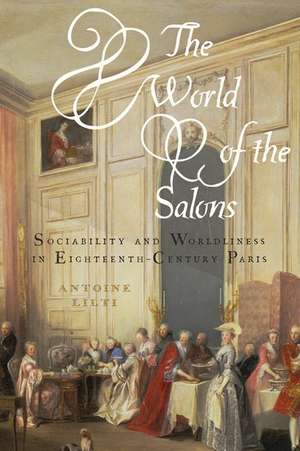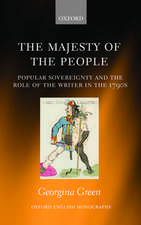The World of the Salons: Sociability and Worldliness in Eighteenth-Century Paris
Autor Antoine Liltien Limba Engleză Hardback – 15 ian 2015
Toate formatele și edițiile
| Toate formatele și edițiile | Preț | Express |
|---|---|---|
| Paperback (1) | 185.41 lei 10-17 zile | |
| Oxford University Press – 8 sep 2020 | 185.41 lei 10-17 zile | |
| Hardback (1) | 593.57 lei 31-38 zile | |
| Oxford University Press – 15 ian 2015 | 593.57 lei 31-38 zile |
Preț: 593.57 lei
Preț vechi: 791.31 lei
-25% Nou
Puncte Express: 890
Preț estimativ în valută:
113.58€ • 118.58$ • 94.00£
113.58€ • 118.58$ • 94.00£
Carte tipărită la comandă
Livrare economică 24-31 martie
Preluare comenzi: 021 569.72.76
Specificații
ISBN-13: 9780199772346
ISBN-10: 0199772347
Pagini: 344
Dimensiuni: 157 x 241 x 31 mm
Greutate: 0.58 kg
Editura: Oxford University Press
Colecția OUP USA
Locul publicării:New York, United States
ISBN-10: 0199772347
Pagini: 344
Dimensiuni: 157 x 241 x 31 mm
Greutate: 0.58 kg
Editura: Oxford University Press
Colecția OUP USA
Locul publicării:New York, United States
Recenzii
Lilti's analysis of the salons has taken the world of Enlightenment studies by storm....It has completely renewed our understanding of one of the most distinctive institutions pre-Revolutionary cultural life in Paris....Salons,...far from being incubators of subversion, were pillars of the established order,...reinforcing rather than subverting aristocratic culture....The Revolution cheerfully swept them away along with the rest of the Ancien Régime of which they were so integrally a part.
An original and compelling account of the reality of life in the salons...[that] has enriched our understanding of Old Regime society and culture in the process.
Translated, Lilti's findings need to be better incorporated into current Enlightenment syntheses and widely taught and debated....This is an admirable, important book for Enlightenment scholars.
There is no question that this is an absolutely brilliant book, the fruit of exhaustive research, and a historiographical game changer. Lilti does a masterful job of stripping away the veneer of retrospective characterizations of salons, and he presents us with a meticulous portrait of salons as they functioned and as they were perceived in their own time. Anyone writing about the intellectual climate of the eighteenth century will have to contend with his argument.
Antoine Lilti's book is a masterpiece. Grounded in exhaustive social historical research, it offers the most complete picture ever produced of 'salon society' in eighteenth-century France, dispelling countless myths and revealing the social background against which so much of the Enlightenment took shape. At the same time, its trenchant and original approach, grounded in cutting-edge social and cultural theory, makes it essential reading for anyone interested in what Robert Darnton famously described as the 'social history of ideas.'
A rich and multi-faceted account of an essential eighteenth-century social and cultural context. If we know it today as the 'salon,' it was only named as such after the fact. What is more, Lilti argues, this world never did quite conform to the standard notions that we have inherited of it, whether via Rousseau esque aversion to aristocratic culture or post Revolutionary nostalgia for polite society.
Lilti has produced an original and compelling account of the reality of life in the salons and he has enriched our understanding of Old Regime society and culture in the process.
The picture Lilti paints of the eighteenth-century salon stands in stark contrast to the one drawn by those who have tried to write its history in the light of Habermas's theory of the bourgeois public sphere. A number of the broader claims made by this dense and rewarding book, however, suggest that salons matter more than we have previously thought. Not only has Lilti reaffirmed that the subject will remain a vital element in a number of on going historical debates - concerning the roles of writers, the dimensions of the public sphere, the formation of public opinion, and the nature of Old Regime politics - but he has opened up new lines of inquiry by exploring such themes as the construction of social identities, the links between mondanite and literature, and the constitution of national stereotypes.
Le monde des salons offers a fresh and innovative perspective on the salons of eighteenth-century Paris. Antoine Lilti is an important new voice in the history of early modern France, and his stimulating book is sure to make a splash in the historiography of old regime cultural practices. Lilti writes with the grace and confidence of a seasoned professional, and Le monde des salons is certainly the new 'must read' on the history of the pre-Revolutionary French salon.
Antoine Lilti's Le Monde des salons is the most thorough and important study of eighteenth-century French salons to date. Methodologically sophisticated, it distinguishes between how contemporaries talked about salons and what actually took place in them. In doing so, it explodes several myths. First, it puts the lie to recent interpretations that have depicted salons as crucibles of modern egalitarianism - places where social hierarchy gave way to polite, enlightened conversation among equals. Second, Lilti shatters the image of salons as literary founts of enlightenment. Third, Lilti challenges the Tocquevillian notion that salons were sites for the elaboration of abstract literary politics and oppositional public opinion. Far from providing naive, disempowered philosophes a place to concoct seditious ideologies, salons were where savvy socialites bolstered their social, cultural, and political capital.
[A] useful contribution to redirecting the historiographical orthodoxy on salon sociability
An original and compelling account of the reality of life in the salons...[that] has enriched our understanding of Old Regime society and culture in the process.
Translated, Lilti's findings need to be better incorporated into current Enlightenment syntheses and widely taught and debated....This is an admirable, important book for Enlightenment scholars.
There is no question that this is an absolutely brilliant book, the fruit of exhaustive research, and a historiographical game changer. Lilti does a masterful job of stripping away the veneer of retrospective characterizations of salons, and he presents us with a meticulous portrait of salons as they functioned and as they were perceived in their own time. Anyone writing about the intellectual climate of the eighteenth century will have to contend with his argument.
Antoine Lilti's book is a masterpiece. Grounded in exhaustive social historical research, it offers the most complete picture ever produced of 'salon society' in eighteenth-century France, dispelling countless myths and revealing the social background against which so much of the Enlightenment took shape. At the same time, its trenchant and original approach, grounded in cutting-edge social and cultural theory, makes it essential reading for anyone interested in what Robert Darnton famously described as the 'social history of ideas.'
A rich and multi-faceted account of an essential eighteenth-century social and cultural context. If we know it today as the 'salon,' it was only named as such after the fact. What is more, Lilti argues, this world never did quite conform to the standard notions that we have inherited of it, whether via Rousseau esque aversion to aristocratic culture or post Revolutionary nostalgia for polite society.
Lilti has produced an original and compelling account of the reality of life in the salons and he has enriched our understanding of Old Regime society and culture in the process.
The picture Lilti paints of the eighteenth-century salon stands in stark contrast to the one drawn by those who have tried to write its history in the light of Habermas's theory of the bourgeois public sphere. A number of the broader claims made by this dense and rewarding book, however, suggest that salons matter more than we have previously thought. Not only has Lilti reaffirmed that the subject will remain a vital element in a number of on going historical debates - concerning the roles of writers, the dimensions of the public sphere, the formation of public opinion, and the nature of Old Regime politics - but he has opened up new lines of inquiry by exploring such themes as the construction of social identities, the links between mondanite and literature, and the constitution of national stereotypes.
Le monde des salons offers a fresh and innovative perspective on the salons of eighteenth-century Paris. Antoine Lilti is an important new voice in the history of early modern France, and his stimulating book is sure to make a splash in the historiography of old regime cultural practices. Lilti writes with the grace and confidence of a seasoned professional, and Le monde des salons is certainly the new 'must read' on the history of the pre-Revolutionary French salon.
Antoine Lilti's Le Monde des salons is the most thorough and important study of eighteenth-century French salons to date. Methodologically sophisticated, it distinguishes between how contemporaries talked about salons and what actually took place in them. In doing so, it explodes several myths. First, it puts the lie to recent interpretations that have depicted salons as crucibles of modern egalitarianism - places where social hierarchy gave way to polite, enlightened conversation among equals. Second, Lilti shatters the image of salons as literary founts of enlightenment. Third, Lilti challenges the Tocquevillian notion that salons were sites for the elaboration of abstract literary politics and oppositional public opinion. Far from providing naive, disempowered philosophes a place to concoct seditious ideologies, salons were where savvy socialites bolstered their social, cultural, and political capital.
[A] useful contribution to redirecting the historiographical orthodoxy on salon sociability
Notă biografică
Antoine Lilti is director of studies at L'Ecole des Hautes Etudes en Sciences Sociales.















